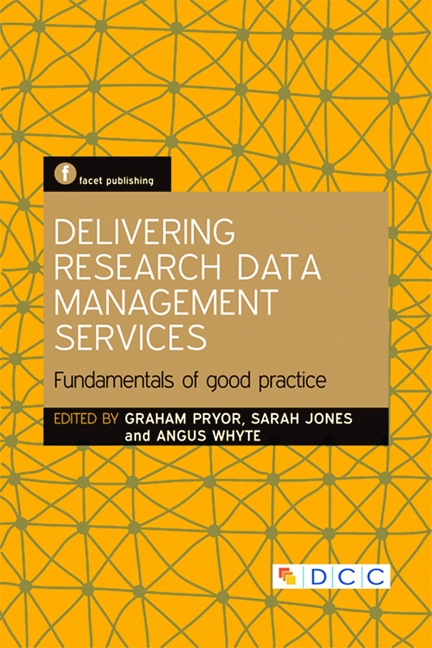Book contents
- Frontmatter
- Contents
- Preface
- Contributors
- 1 A patchwork of change
- 2 Options and approaches to RDM service provision
- 3 Who's doing data? A spectrum of roles, responsibilities and competences
- 4 A pathway to sustainable research data services: from scoping to sustainability
- 5 The range and components of RDM infrastructure and services
- 6 Case study 1: Johns Hopkins University Data Management Services
- 7 Case study 2: University of Southampton – a partnership approach to research data management
- 8 Case study 3: Monash University, a strategic approach
- 9 Case study 4: a national solution – the UK Data Service
- 10 Case study 5: development of institutional RDM services by projects in the Jisc Managing Research Data programmes
- Index
7 - Case study 2: University of Southampton – a partnership approach to research data management
Published online by Cambridge University Press: 08 June 2018
- Frontmatter
- Contents
- Preface
- Contributors
- 1 A patchwork of change
- 2 Options and approaches to RDM service provision
- 3 Who's doing data? A spectrum of roles, responsibilities and competences
- 4 A pathway to sustainable research data services: from scoping to sustainability
- 5 The range and components of RDM infrastructure and services
- 6 Case study 1: Johns Hopkins University Data Management Services
- 7 Case study 2: University of Southampton – a partnership approach to research data management
- 8 Case study 3: Monash University, a strategic approach
- 9 Case study 4: a national solution – the UK Data Service
- 10 Case study 5: development of institutional RDM services by projects in the Jisc Managing Research Data programmes
- Index
Summary
Introduction
By 2009 researchers at the University of Southampton had been working for some time with the issues around eScience and the challenges posed by integrating research data with publication (Heery et al., 2004). Individual researchers were already engaged in national collaborations, but it was the experience of collaboration around the UK Research Data Service (UKRDS) feasibility project in 2008–9 that acted as the catalyst for initiatives to support researchers across the institution in managing their research data. UKRDS was a sectorwide initiative to investigate how the UK could respond to the increasing pressure on institutions to manage their researchers’ data. It initiated a corpus of work on the complexities of storage, retrieval, preservation and reuse and, if the proposal for a national framework did not go forward, the knowledge gained on the issues for the successful management of research data provided the background for the next phase of development. UKRDS was built on a partnership between the librarians, heads of computing services and leading researchers in the major research universities who, together with Jisc and HEFCE, set out a programme to respond to the needs of the research community. It was this collaborative approach that was taken forward in the next phase of development.
The University of Southampton is a major researchled university with a broad spread of disciplines and receives a significant level of research income. In line with the major commitment to science and engineering, the university had since 2000 been investing considerable resource in highperformance computing with the consequent increase in data output. In terms of managing research data, at the outset of the project there were some disciplines for which the deposit of data for the purposes of archiving and sharing was well established, but for the majority of research areas there was no corresponding facility.
UKRDS estimated that 21% of UK researchers used a national or international facility, and that there was an increasing level of data sharing. At Southampton this was reflected in the deposit of data in the national data centres, such as those provided by NERC, ESRC, UKDA or the RutherfordAppleton Laboratory, but there were important areas left without a model for data deposit and archiving, and little provision to match the level of interdisciplinary and transinstitutional research being conducted.
- Type
- Chapter
- Information
- Delivering Research Data Management ServicesFundamentals of Good Practice, pp. 135 - 162Publisher: FacetPrint publication year: 2013
- 3
- Cited by

